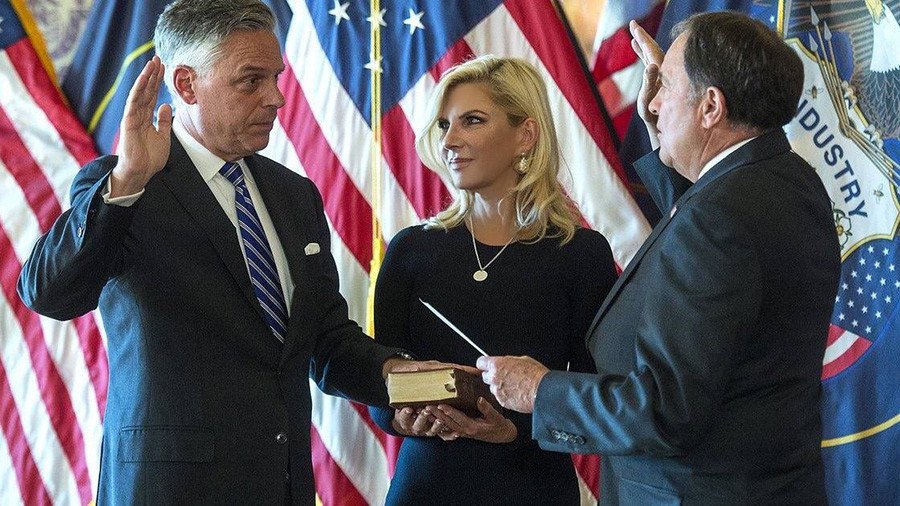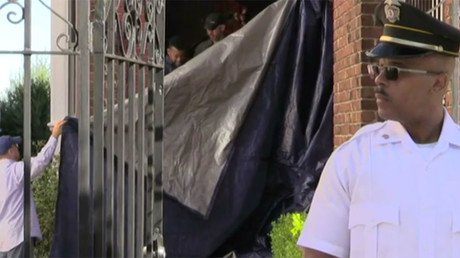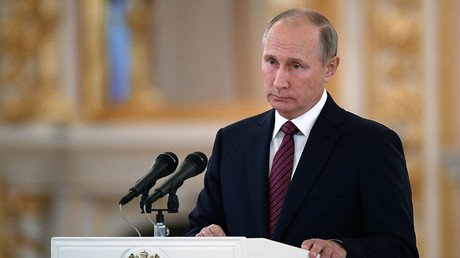US ambassador sees no link between RT America’s FARA registration & loss of Congress credentials?

RT America’s registration as a ‘foreign agent’ in the US ultimately led to them losing accreditation on Capitol Hill, but US Ambassador to Russia Jon Huntsman does not see a link between the two events.
Last month, the US Department of Justice ordered RT America (officially registered as T&R Productions LLC) to register under the Foreign Agents Registration Act – a 1938 law initially targeting Nazi German propaganda in the US. Top Russian figures, including President Vladimir Putin, repeatedly condemned the step, saying that registering Russian news outlets under FARA would restrict freedom of speech in America.
While US officials remained adamant that registering under FARA would not affect RT reporters’ ability to carry out their work in any way, last week, RT America’s accreditation on Capitol Hill was withdrawn by the Executive Committee of the Congress Radio & Television Correspondents’ Galleries – precisely because of the ‘foreign agent’ status. The move came mere hours after the US State Department said the US Foreign Agents Registration Act “does not restrict an organization’s ability to operate.”
Meet ‘foreign agent’: Americans in America covering American news for Americans https://t.co/CAHPJCLzQTpic.twitter.com/ojYLS1z3v8
— RT (@RT_com) November 21, 2017
“The rules of the Galleries state clearly that news credentials may not be issued to any applicant employed ‘by any foreign government or representative thereof.’ Upon its registration as a foreign agent under the Foreign Agents Registration Act (FARA), RT Network became ineligible to hold news credentials,” the letter informing of the loss of accreditation to work on Capitol Hill said.
When pressed by Russian journalists that registration under FARA did have very real consequences for journalistic work, Ambassador Huntsman tried to obfuscate the connection between FARA and the removal of RT’s Congressional credentials based on technicalities, despite the letter’s explicit wording:
“Well, I don’t think that is associated with FARA. You’d have to look into why the accreditation was handled the way it was,” Jon Huntsman told Russian radio station Kommersant FM. “That might be again a result of the 98 to 2 vote [on the Russia sanctions bill] which has left a very deep sentiment on Capitol Hill. It may be a carryover of that. But if I’m not mistaken, I don't think that was in any way tied to FARA, as a part of FARA, for example. I don’t think FARA calls for the restricting of access or taking of credentials.”
Margarita Simonyan, editor in chief of both RT and Sputnik news agency, was brief in her response.
“The fine-heartedness of the American ambassadors makes me smile,” she said.
The US Department of Justice places a number of obligations on the registered foreign agents – certain financial and staffing disclosures among them. FARA legislation itself does not spell out the rules related to press access to US government bodies.
However, the letter from the Congressional Galleries’ Executive Committee, which came on a House of Representatives letterhead, is clear evidence that there are entities empowered to control journalistic activities and access to US government bodies specifically on the basis of FARA.
This directly contradicts affirmations from Ambassador Huntsman about the lack of association between revocation of RT credentials and FARA.
READ MORE: Russian lower house bans reporters representing ‘foreign-agent’ media outlets
In Russia, nine media outlets, including Voice of America and Radio Liberty, have been registered under a ‘foreign agents’ law adopted in response to Washington’s policy. On Wednesday, the lower chamber of the Russian Parliament, the State Duma, voted not to ban VoA and Radio Liberty from their meetings with MPs, stressing this was a political move and a reciprocal measure.
















